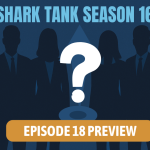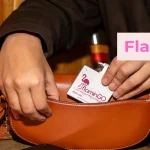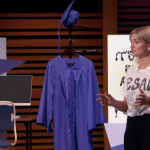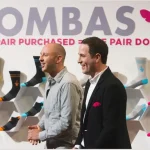Psyonic Shark Tank Update – Shark Tank Season 15
Dr. Aadeel Akhtar pitched Psyonic’s Ability Hand on Shark Tank, securing a $1 million deal with Kevin, Daymond, and Lori. The Ability Hand is a fast, affordable bionic prosthetic offering groundbreaking touch feedback and Medicare coverage, changing lives for amputees worldwide.
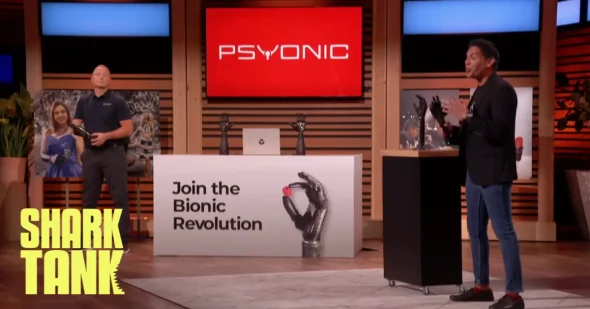
Highlights
- Psyonic’s Ability Hand is the fastest bionic hand on the market and uniquely provides touch feedback to users through vibrating sensors in the fingertips.
- Dr. Akhtar is committed to making the advanced Ability Hand affordable, achieving Medicare coverage and utilizing cost-effective methods, with a price range of $10,000 to $20,000.
- Dr. Akhtar secured a $1 million investment for 6% equity from Sharks Kevin O’Leary, Daymond John, and Lori Greiner to help ramp up production of the high-demand Ability Hand.
Dr. Aadeel Akhtar pitched Psyonic, his bionic artificial limb company, on Shark Tank episode 1516. Akhtar holds advanced degrees in mechanical engineering and neuroscience. He got the inspiration to create such a business when he was only 7 years old. While visiting his parents’ native Pakistan, he saw a little girl his age without one leg. From that day on, he knew what his life’s work would be.
Psyonic’s best product is called the Ability Hand. What makes it special is how it lets users feel things. It has tiny sensors in the fingertips that vibrate. This gives a feeling like never before in fake hands. A doctor named Akhtar and his team made it. It’s light, strong, and very good at doing small movements. So, people can do things easily and feel sure of themselves.
Psyonic really wants to help people get this hand. They work hard to make it not just amazing, but also not too expensive. They use cheaper materials and ways to build it. Because of this, the price is low enough that Medicare helps pay for it. This means more people can get this hand that changes lives. It costs somewhere between $10,000 and $20,000. Dr. Akhtar probably wants the Sharks to invest money to make even more of these hands.
About Psyonic
| Category | Details |
| Founder | Dr. Aadeel Akhtar |
| Product Type | Multi-articulated bionic prosthetic hand |
| Funding (Pre-Shark Tank) | $3.6 million |
| Investment Asked | $1 million |
| Equity Offered | 2% |
Video
Psyonic Pitch
Dr. Akhtar entered the Shark Tank with Sergeant Garrett Anderson, who wore an Ability Hand on his right arm. The doctor was seeking $1 million for 2% equity in his company. Psyonic develops advanced bionic limbs that are accessible to both humans and robots. When he was 7 years old, the doctor met someone who was missing a limb for the first time. She was his age, living in poverty in Pakistan, where he was visiting. She was missing her right leg and used a tree branch as a crutch. That inspired him to go into this field and that’s why he developed the Ability Hand.
It is the fastest bionic hand on the market and the first to provide touch feedback to users. You can control it with your muscles, like Sergeant Anderson. The hand is waterproof and USB rechargeable. You can even charge your phone from your hand. The Ability Hand has made a big difference in the lives of its users. Sergeant Anderson can actually hold and feel his daughter’s hand with the Ability Hand, something he couldn’t do with any other prosthetic before. He can also take the Ability Hand to the extreme. At one point, Sergeant Anderson broke a board with his Ability Hand, and the Sharks shouted in amazement.
The Ability Hand isn’t just for prosthetics; it is also being used on robots all around the world, including at major tech companies and even in missions into space. The doctor asked the Sharks, “Who wants to join the bionic revolution and change the world one hand at a time?”
Examining The Ability Hand
Sergeant Anderson introduced himself to the Sharks. He lost his hand and arm in Iraq in 2005 from an improvised explosive device. He used many prosthetics during his 18 years as an amputee. They were too heavy, too slow, and not durable. The bionic hand has really changed his life and given him a new way to interact in society. Mark Cuban thanked him for his service.
Lori asked the doctor how he came up with this. After he met that girl in Pakistan, he earned a bachelor’s degree in biology at Loyola. Next, he obtained a master’s degree in computer science and another master’s in electrical and mechanical engineering. He also earned a PhD in neuroscience and then went to medical school. When he was a graduate student, he started 3D printing the hands.
Let’s Talk Numbers
So far, he has raised $3.6 million. He is also in the midst of a StartEngine campaign where he hopes to raise another $2 million. They raised $1.4 million at a $12 million valuation and $2.2 million at a $15 million valuation. They secured $2.4 million in grant funding, and they should be receiving another $2.7 million next year from the Department of Defense. Mark questioned why they used StartEngine, and the doctor explained that they make half of their sales through social media.
It is an FDA-registered device that is covered by Medicare. Before this hand came along, only 10% of patients could afford it. An Ability Hand costs $15,500, and it costs $1,800 to make. They currently have over 100 patients, but the problem is that there is more demand than they can produce.
He wants to start ramping up production to meet demand. Their production capacity is currently 100 hands per year. Next year, they plan to produce 500, and 1,000 the year after that. Doctors who work with prosthetics are taking all they can make. To reach a capacity of 500 units per year will cost $5 million. When he pitched to robotics investors, some didn’t care for the mission focused on humans.
What Makes Psyonic Unique?
These are some features that make the product unique:
- It moves fingers and grips things faster than any other bionic hand.
- Users can feel what they touch. Sensors send signals to their nerves.
- In the U.S., Medicare helps pay for it. This makes it easier to get.
- It’s made of strong, light stuff used in airplanes. It’s comfy to wear.
- You can charge phones and other things right from the hand. Water
- It can handle splashes and a little water.
- People can use it, and it can also be used for robots and science work.
- It can sense when you touch it in more than one spot. This gives better control.
- Scientists can make their own programs to work with it. This helps with new ideas.
- Big groups like these trust it, showing it can do a lot.
Read more posts about Psyonics: Revolutionizing Prosthetics on the Shark Tank Blog.
View this post on Instagram
Did Psyonic Get a Deal on Shark Tank?
Mark had a hard time believing that healthcare equity investors didn’t support the idea, considering it has the potential to change lives. Something didn’t sit right with him, so he decided not to invest. Robert shared a story about Noah Galloway from his time on Dancing With the Stars.
Noah had lost both his arm and leg, so Robert understood the challenges amputees face, including issues like infections. He asked how the hand attaches, and the doctor explained that a prosthetist creates a custom socket for each amputee, and Psyonic attaches the hand to that socket. While Robert was deeply moved by the mission and recognized its significance, he ultimately chose to pass on the opportunity.
Kevin asked for some clarity on the numbers. Lifetime sales were $2 million. In 2022, sales reached just over $1 million, and they earned a profit of $100,000. For the current year, they project revenue of around $2 million. Kevin remarked that he doesn’t get out of bed for 2%, knowing he’d likely be diluted as the company raises more funds. He offered $1 million for 10%, but that was too high for Dr. Akhtar.
Daymond and Lori teamed up to offer $1 million for 6%, specifying that they didn’t want to be diluted either. The doctor countered with $1 million for 2%, plus 1% each in advisory shares. Kevin jumped in to explain preference shares—shares that can’t be diluted—and outlined how they could pose problems for other shareholders. Daymond and Lori responded that they would accept the doctor’s offer if the shares were non-dilutable.
Dr. Akhtar then countered with $1 million for 4% in non-dilutable shares. Kevin expressed interest in joining the deal with Daymond and Lori but suggested they take 2% each, totaling 6% for $1 million, with shares that could be diluted. Dr. Akhtar accepted the deal.
What Happened to Psyonic After Shark Tank?
The Shark Tank Blog constantly provides updates and follow-ups about entrepreneurs who have appeared on the Shark Tank TV show. It turns out the company’s StartEngine Campaign, the doctor mentioned during his pitch to the Sharks, only raised $1,065,170.94.
In May 2024, Psyonic partnered with EastPoint Prosthetics & Orthotics and Advanced 3D, Inc. to make custom-made prosthetic sockets for the Ability Hand.
The partnership has the goal of making advanced bionic limbs more accessible and affordable. As of the first re-run of this episode in June 2024 – about 3 months after the original air date – there is no evidence that the deal with the Sharks closed. The company, at this time, is valued at $65.07 million.
The Shark Tank Blog will follow up on Chirp & Dr. Aadeel Akhtar as more details become available.
Where Can You Buy It?
The Ability Hand by Psyonic is available online. It is typically distributed through prosthetic clinics and professionals who customize the fit for each user. Check out their Facebook profile or Instagram page.
Quick Summary
- Dr. Akhtar brought his business, Psyonic, on Shark Tank.
- Psyonic makes Ability Hand, a bionic prosthetic with touch feedback.
- The entrepreneur secured a deal with Kevin, Daymond, and Lori.
1. When was Psyonic on Shark Tank?
Psyonic was on Shark Tank in episode 1516.
2. Did Psyonic get a deal on Shark Tank?
Yes, Psyonic got a $1 million deal for 6% equity.
3. Who is the CEO of PSYONIC?
Dr. Aadeel Akhtar is the CEO of Psyonic.





